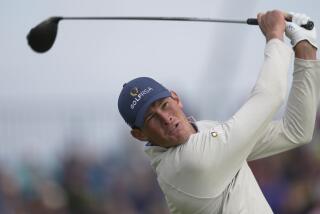Missing on the Links
SOUTHPORT, England — Seven years ago on this very same Royal Birkdale golf course, the name Ian Baker-Finch was etched on the British Open trophy and he was recognized as one of the world’s top players.
But mention Ian Baker- Finch’s name today and you might see a lot of people shake their heads sadly, then sort of move away, as though they’re afraid they might catch something.
Baker-Finch hit every fairway and every green, shot a 66 on the last day of the 1991 British Open, beat Norman and Faldo and Ballesteros and Price and Watson and all the rest . . . and then, well, basically, he just plain lost it.
Actually, Baker-Finch lost his game, but that doesn’t reflect the stupendously horrific free-fall that has gone on for the Australian player.
He hasn’t made a cut in three years. He hasn’t made a cut on the PGA Tour in his last 32 tries.
Last year at the British Open at Royal Troon in Scotland, he shot a first-round 92 and withdrew. It was the worst score by a former British Open champion in modern times.
Two years before, on the first tee at St. Andrews, he hit his drive nearly 200 yards off-line, a snap hook of such monumental proportions that it left the first fairway, crossed the adjacent 18th fairway and rolled out of bounds--way out of bounds--toward the gray stone buildings that line the street.
There are slumps and there are slumps, but calling what happened to Baker-Finch a slump is like calling the North Sea a nice little pond.
In the last four years, Baker-Finch has made less than $20,000 playing golf, which is not a good way to stay in business. But then, Baker-Finch has been out of business for quite a while now. He has gone through more than 30 coaches and well-intentioned helpers in an effort to get back on track. Nothing has worked.
Maybe it was a question of confidence. The son of an electrician-sawmill operator-farmer from a small town near Brisbane, Baker-Finch was a good player, but not a great one early on. And he knew it.
“I always thought of myself as just a farm boy,” he once said. “I never believed in myself enough. I didn’t like my swing. I was always trying to change it. I never saw myself as the equal of Nick Faldo or [Greg] Norman. I never thought I had that kind of talent.”
Maybe, but that doesn’t explain why he was able to beat them both at Birkdale, where he even shot a 29 on the front nine Sunday.
But Baker-Finch decided he could be even better, so he tried to add some length to his game. If he didn’t like his swing all that much before, he would really come to detest it later.
The list of coaches who tried to help Baker-Finch is a Who’s Who in golf: David Leadbetter, Rick Smith, Chuck Cook, Hank Haney, Butch Harmon, Jim Flick.
He tried the best sports psychologists: Bob Rotella, Dick Coop, Jim Loehr. But Baker-Finch wasn’t getting any better.
Coop was saddened that he couldn’t help. A sports psychologist at the University of North Carolina, Coop said Baker-Finch told him that he derived his early fundamentals and mechanics from an unusual source--pictures of Jack Nicklaus torn out of a magazine.
“He told us he took pictures of Nicklaus from a golf magazine, stuck them in the ground with tees to hold them so they wouldn’t blow away, then tried to recreate Nicklaus’ swing,” Coop said.
By the time Baker-Finch showed up on Coop’s doorstep, his swing looked as if he had copied it from pictures out of Mad magazine. What Baker-Finch wanted to work on when they spent time together was to drive it longer, because he wanted to win more majors.
“But he couldn’t find his rear end, basically,” Coop said.
Because of his British Open victory, the 37-year-old Baker-Finch still has a 10-year exemption to play the PGA Tour, but he hasn’t played this year and doesn’t intend to. This week, he will work as a commentator for ABC.
If things were fair, this would be a proud occasion for Baker-Finch as a past champion. If things were fair, it would be a great chance for him to enjoy the moment, to think about all the great things that have happened in his career since he broke through at Royal Birkdale.
The problem is, there has been so little. And the way things work, this year’s tournament is destined to serve only as constant reminder of his shortcomings.
Since he held the Claret Jug on the 18th green at Royal Birkdale that Sunday afternoon in July, seven years go, Baker-Finch has received nearly 5,000 letters. Some have offered support, some encouragement and a lot of them advice.
It’s not that easy, you see. He has already tried at least that number of different ways to end a slump. But this one’s not going away, at least not right now.
British Open Facts
* When: Thursday through Sunday.
* Where: Royal Birkdale Golf Club, Southport, England.
* Defending champion: Justin Leonard.
* TV: Thursday-Friday, ESPN; Saturday-Sunday, Ch. 7
(BEGIN TEXT OF INFOBOX / INFOGRAPHIC)
Tough Times
Since Ian Baker-Finch won the British Open in 1991, his yearly earnings have plummeted:
YEAR: EARNINGS
1991: $649,513
1992: $261,817
1993: $140,621
1994: $81,326
1995: $0
1996: $0
1997: $0
1998: $0
NOTE: 1998 British Open winner’s share: $498,000; 1991: $150,000.
More to Read
Go beyond the scoreboard
Get the latest on L.A.'s teams in the daily Sports Report newsletter.
You may occasionally receive promotional content from the Los Angeles Times.









